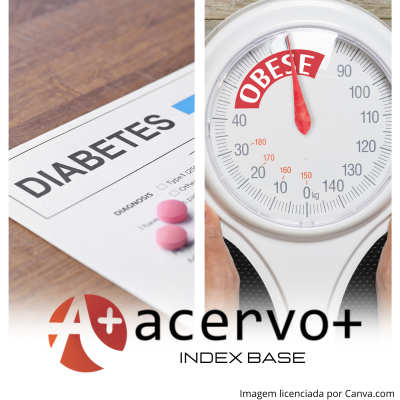Tratamento cirúrgico versus clínico para pacientes com diabetes mellitus tipo 2 e obesidade leve a grave
##plugins.themes.bootstrap3.article.main##
Resumo
Objetivo: Comparar o tratamento cirúrgico versus clínico para pacientes com diabetes mellitus tipo 2 (DM2) e obesidade leve a grave. Avaliando os benefícios das duas modalidades terapêuticas e buscando responder qual traz mudanças mais significativas nos parâmetros da DM2. Métodos: Trata-se de uma revisão integrativa da literatura nas bases de dados National Library of Medicine e Biblioteca Virtual em Saúde. Foram utilizados os Descritores em Ciências da Saúde (DeCS): “cirurgia bariátrica”, “diabetes mellitus”, “resultado de tratamento”. Os critérios de inclusão foram texto completo gratuito, ensaio clínico, teste controlado e aleatório, publicados em inglês, português e espanhol no intervalo de 2014 a 2024. Resultados: Foram incluídos 12 ensaios clínicos randomizados (ECRs) relativos a 1049 pacientes, sendo 474 submetidos a tratamento cirúrgico metabólico e 575 a tratamento clínico isolado, associado ou não a mudança no estilo de vida. O seguimento variou de 12 a 60 meses. Considerações finais: O tratamento cirúrgico metabólico é superior ao tratamento clínico para remissão de DM2 a curto e longo prazo quanto aos benefícios nas condições metabólicas e fatores de risco cardiovasculares. Conduto, essa superioridade está associada principalmentea redução da obesidade, a qual é muito mais intensa no grupo de tratamento cirúrgico.
##plugins.themes.bootstrap3.article.details##
Copyright © | Todos os direitos reservados.
A revista detém os direitos autorais exclusivos de publicação deste artigo nos termos da lei 9610/98.
Reprodução parcial
É livre o uso de partes do texto, figuras e questionário do artigo, sendo obrigatória a citação dos autores e revista.
Reprodução total
É expressamente proibida, devendo ser autorizada pela revista.
Referências
2. AMINIAN A, et al. Patient-reported Outcomes After Metabolic Surgery Versus Medical Therapy for Diabetes: Insights From the STAMPEDE Randomized Trial. Annals of Surgery, 2021; 274(3): 524–532.
3. ARAS M, et al. Obesity and Diabetes. Nursing Clinics of North America, 2021; 56(4): 527–541.
4. ARTERBURN AOS, et al. Association Between Bariatric Surgery and Long-term Survival. JAMA, 2015; 313(1): 62.
5. CHANG S-H, et al. The Effectiveness and Risks of Bariatric Surgery: An Updated Systematic Review and Meta-analysis, 2003-2012. JAMA Surg, 2014; 149(3): 275.
6. COHEN RV, et al. Effect of Gastric Bypass vs Best Medical Treatment on Early-Stage Chronic Kidney Disease in Patients With Type 2 Diabetes and Obesity: A Randomized Clinical Trial. JAMA Surg, 2020; 155(8): 200420.
7. COURCOULAS AP, et al. Bariatric Surgery vs Lifestyle Intervention for Diabetes Treatment: 5-Year Outcomes From a Randomized Trial. The Journal of Clinical Endocrinology & Metabolism, 2020; 105(3): 866–876.
8. COURCOULAS AP, et al. Surgical vs Medical Treatments for Type 2 Diabetes Mellitus: A Randomized Clinical Trial. JAMA Surg, 2014; 149(7): 707.
9. COURCOULAS AP, et al. Three-Year Outcomes of Bariatric Surgery vs Lifestyle Intervention for Type 2 Diabetes Mellitus Treatment: A Randomized Clinical Trial. JAMA Surg, 2015; 150(10): 931.
10. CUMMINGS DE, et al. Gastric bypass surgery vs intensive lifestyle and medical intervention for type 2 diabetes: the CROSSROADS randomised controlled trial. Diabetologia, 2016; 59(5): 945–953.
11. GOYAL R, et al. Type 2 Diabetes. In: StatPearls. Treasure Island (FL): StatPearls Publishing, 2024.
12. HALPERIN F, et al. Roux-en-Y Gastric Bypass Surgery or Lifestyle With Intensive Medical Management in Patients With Type 2 Diabetes: Feasibility and 1-Year Results of a Randomized Clinical Trial. JAMA Surg, 2014; 149(7): 716.
13. HSU C-C, et al. Effect of Bariatric Surgery vs Medical Treatment on Type 2 Diabetes in Patients With Body Mass Index Lower Than 35: Five-Year Outcomes. JAMA Surg, 2015; 150(12): 1117.
14. IKRAMUDDIN S, et al. Durability of Addition of Roux-en-Y Gastric Bypass to Lifestyle Intervention and Medical Management in Achieving Primary Treatment Goals for Uncontrolled Type 2 Diabetes in Mild to Moderate Obesity: A Randomized Control Trial. Diabetes Care, 2016; 39(9): 1510–1518.
15. ILYAS S, et al. Bariatric Surgery and Type 2 Diabetes Mellitus: Assessing Factors Leading to Remission. A Systematic Review. Cureus, 2020.
16. KHOO CM, et al. Effects of Roux-en-Y Gastric Bypass or Diabetes Support and Education on Insulin Sensitivity and Insulin Secretion in Morbidly Obese Patients With Type 2 Diabetes. Annals of Surgery, 2014; 259(3): 494–501.
17. MADSBAD S, et al. Mechanisms of changes in glucose metabolism and bodyweight after bariatric surgery. The Lancet Diabetes & Endocrinology, 2014; 2(2): 152–164.
18. PANUGANTI KK, et al. Obesity. In: StatPearls. Treasure Island (FL): StatPearls Publishing, 2024.
19. SCHAUER PR, et al. Bariatric Surgery versus Intensive Medical Therapy for Diabetes — 5-Year Outcomes. N Engl J Med, 2017; 376(7): 641–651.
20. SIMONSON DC, et al. Clinical and Patient-Centered Outcomes in Obese Patients With Type 2 Diabetes 3 Years After Randomization to Roux-en-Y Gastric Bypass Surgery Versus Intensive Lifestyle Management: The SLIMM-T2D Study. Diabetes Care, 2018; 41(4): 670–679.
21. WIGGINS T, et al. Association of bariatric surgery with all-cause mortality and incidence of obesity- related disease at a population level: A systematic review and meta-analysis. PLoS Med, 2020; 17(7): 1003206.
22. YAN Y, et al. Roux-en-Y Gastric Bypass Versus Medical Treatment for Type 2 Diabetes Mellitus in Obese Patients: A Systematic Review and Meta-Analysis of Randomized Controlled Trials. Medicine, 2016; 95(17): 3462.

